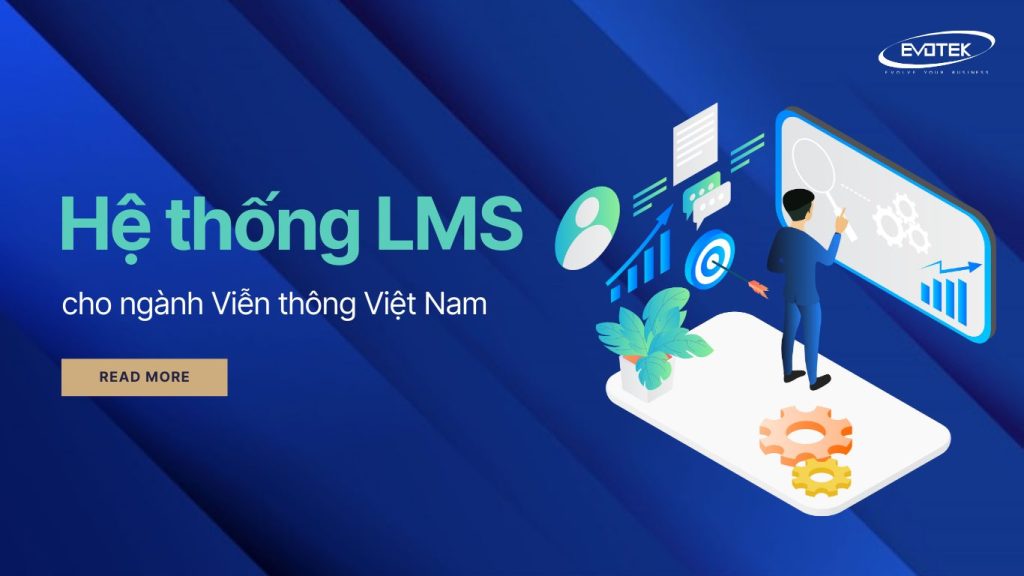Our client is one of the top four telecommunications service providers in Vietnam, affirming its position through modern technology infrastructure and extensive network coverage.
Training challenges in the digital age
Amid the rapid development of the telecommunications industry, our client faces significant challenges in managing and developing human resources through a learning system.
Their training and HR teams need a comprehensive solution to effectively manage employee learning programs, particularly in a constantly evolving digital technology environment that demands continuous knowledge updates. The main issues include:
- Decentralized Knowledge Management: Currently, training programs are delivered through various channels such as in-person sessions, online courses, internal documents, and specialized workshops. This diversity has made it difficult to track, evaluate, and manage the learning progress of individual employees.
- Lack of Evaluation and Monitoring Tools: The company lacks precise tools to measure employees’ knowledge retention and acquisition of new skills after training sessions. The absence of detailed data complicates efforts to refine and enhance training programs.
- Diverse and Specialized Training Needs: Given the dynamic nature of the telecom and IT sectors, employees require training in a wide range of areas, such as 5G network technology, cybersecurity, cloud services, artificial intelligence, and soft skills like communication and customer service.
- Difficulty in Personalized Learning: Each employee has unique backgrounds and developmental needs. However, the current system does not support personalized training programs tailored to specific job roles and individual goals.
- Integration and Data Synchronization Issues: Integrating the LMS with existing HR systems, competency assessments, and career development tools poses significant challenges. This lack of seamless integration results in inefficient learning management and disjointed data tracking.
- Cost and Training Effectiveness: Current training programs are costly but fail to demonstrate clear effectiveness, lacking tools to measure and compare learning outcomes with investment.
Our goal is to develop a comprehensive, flexible, and intelligent Learning Management System (LMS) capable of:
- Centralizing and synchronizing all training activities
- Offering personalized courses
- Precisely evaluating learning outcomes
- Seamlessly integrating with HR management systems
- Reducing costs while improving training quality
The LMS solution will enable the company to transform its training approach from traditional models to a modern, flexible, and efficient digital learning system.
Solution
To meet the needs of efficient human resource management and development in the telecommunications sector, we have developed a comprehensive and flexible LMS solution.

Learning Management: The LMS centralizes and tracks all training activities, featuring:
- A course catalog categorized by specialization, job roles, and skill levels
- Personalized learning paths based on each employee’s development needs
- Tools for course registration, progress tracking, and completion
- Digital certificate management upon successful course completion
Exam Management: The LMS includes an integrated exam management system with features such as:
- Scheduling and managing periodic or ad hoc exams
- Creating and managing question banks and e-assessments
- Tracking exam registrations, progress, and results
- Analyzing exam performance to compare skill levels among employees
- Built-in notifications and reports on exam progress and outcomes

Assessment and Monitoring: Our learning assessment tools are tailored to the telecommunications environment, allowing the company to:
- Evaluate employee competencies post-training with accuracy
- Analyze and compare employee progress before and after training
- Recommend suitable courses for skill development

Flexible Integration and Configuration: The LMS is designed for adaptability, enabling the business to:
- Quickly update course catalogs based on technological trends
- Seamlessly integrate with HR systems to ensure synchronized information
- Customize system configurations and access permissions for different user groups
Additional Features
- Training plan management and progress alerts
- Cost-effectiveness analysis of training programs
- Creation and management of digital certificates linked to employee profiles
The LMS is not just a training management tool but a learning catalyst that enhances employee competencies and propels organizations into the digital era.
Result
The LMS has significantly improved employee training and development. By offering online learning and synchronized content, training completion times have decreased by 40%, enabling employees to quickly acquire knowledge on 5G, AI, and cybersecurity. The completion rate has reached 85%, thanks to personalized learning paths and automated reminders.
The LMS has also helped reduce annual training costs while minimizing work disruptions. Post-training evaluation times have been halved compared to traditional methods.
With its exceptional benefits, the LMS not only addresses training challenges but also serves as a strategic tool that empowers the organization to enhance its competitiveness and excel in the digital era.

 日本語
日本語 한국어
한국어 Tiếng Việt
Tiếng Việt 简体中文
简体中文